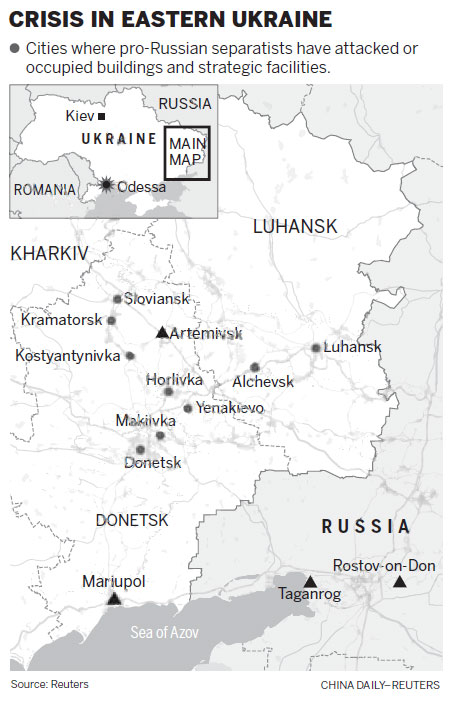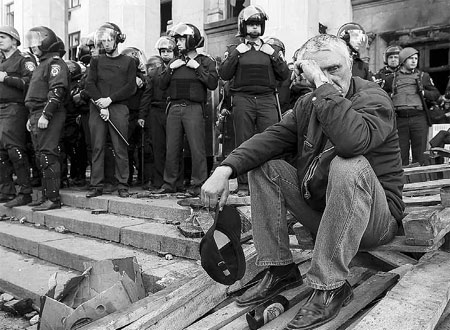Turmoil spreads in east Ukraine
Nation mourns after dozens die in continuing Odessa violence
Ukraine vowed on Sunday to broaden its operation against pro-Russian rebels as the crisis-hit country observed a second day of mourning after violence that left more than 50 people dead.
National Security and Defense Council chief Andriy Parubiy said the armed forces would expand the "active stage of the operation in other towns where extremists and terrorists are carrying out illegal activities".
AFP reporters near the eastern town of Kostyantynivka, where rebels seized the town hall on April 28, saw a pro-Russian checkpoint abandoned and smoldering while barricades were being hastily erected in the center.
Rebels defending the town hall behind makeshift barriers told AFP there had been fighting overnight near the town's television tower.
In nearby Kramatorsk, pro-Russians were holed up in the town hall and burned-out trolley buses and minivans blocked off streets in the city center.
On Saturday, fierce gunbattles erupted around the flashpoint town of Sloviansk as the army stormed rebel-held checkpoints, tightening the noose around what has become the epicenter of pro-Russian fervor.
Central Sloviansk was relatively calm early on Sunday but citizens reported increasing difficulty obtaining basic foodstuffs in the besieged town of 160,000 people.
Sporadic fighting was also reported overnight in the eastern city of Lugansk and the port city of Mariupol.
Mass deaths in Odessa
Interim president Oleksandr Turchynov declared two days of mourning on Saturday after brutal violence in Odessa claimed 42 lives and at least 10 died in military operations around Sloviansk, the worst bloodshed in months.
The scenic Black Sea port of Odessa was bracing for fresh unrest as supporters of the Western-backed government in Kiev planned a new march amid fears it could lead to clashes with pro-Russian protesters.
The city was still reeling from horrific violence on Friday when deadly clashes between the two sides culminated in a building fire that left 38 dead, most overcome by fumes, others from jumping from windows in a desperate bid for survival.
According to the Russia Today news channel, the Trades Union building was set on fire by pro-Kiev "radicals" throwing Molotov cocktails, trapping pro-Moscow activists inside.
The news channel also showed images of a man in a bulletproof vest allegedly firing a pistol in the direction of the building and identifying himself as a leader of pro-Kiev Maidan activists.
Four people died from gunshot wounds in Odessa as the violence that has gripped the eastern part of Ukraine spread to the south, which had until then had been spared.
Prime Minister Arseniy Yatsenyuk visited the city on Sunday and told the BBC he would launch a "full, comprehensive and independent investigation" into the bloodshed, blaming "inefficient" local law enforcement officers.
Ukraine's violence sparked a new round of accusations and counteraccusations between the United States and Moscow as relations between the Cold War foes continued to suffer.
Russian Foreign Minister Sergei Lavrov called his US counterpart John Kerry to demand Washington use its influence over Kiev to stop what he called Ukraine's "war against its own people".
Lavrov warned that the military operations were pushing the former Soviet Republic towards a "fratricidal conflict" and urged a greater mediating role for the OSCE.
Moscow has warned that holding a planned presidential election on May 25 would be "absurd" amid the violence rocking the country.
|
A man, wearing a black and orange ribbon of St. George, a symbol widely associated with pro-Russian protests in Ukraine, sits outside a trade union building where a deadly fire occurred, with members from the Ukrainian Interior Ministry security forces seen in the background, in Odessa on Saturday. Gleb Garanich / Reuters |

(China Daily 05/05/2014 page11)















